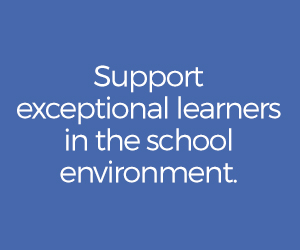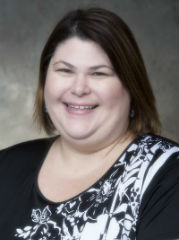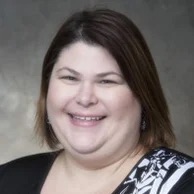Menu
Common Questions: Online Master's Degree in Special Education

Educators play a critical role in supporting students with learning disabilities, behavioral challenges and other exceptional needs. As demand rises for well-trained professionals in this field, earning a master's in special education can open the door to meaningful career opportunities both inside and outside the classroom. If you've ever wondered, "What can you do with a master's in special education?" a wealth of opportunities await you.
Whether you're a certified special education teacher or a professional working in advocacy or early intervention, a graduate degree in this field can help you deepen your knowledge, improve students' progress and pursue advanced roles. You'll gain practical tools to design and deliver individualized education programs (IEPs), support students with varied developmental needs and conditions such as autism spectrum disorder, and meet the legal and instructional requirements that define special education today.
This guide explores what you can do with a special education master's, the types of roles available, and how the online M.Ed. in Special Education programs at Southeastern Oklahoma State University offer flexible, affordable pathways to advance your career and better serve learners with special needs.
How a Special Education Master's Expands Your Career Options

A master's in special education can unlock a wide range of career paths across the K–12 system, higher education, nonprofit organizations and government agencies. Rather than leading directly to teacher certification, this degree deepens your expertise in special education, which can support career advancement, open doors to leadership roles, improve school-wide programs, or expand your ability to provide specialized services that go beyond the classroom.
With this advanced degree, professionals may strengthen their knowledge to support students with learning disabilities, coordinate services for those with autism spectrum disorder, manage compliance with IEPs or design district-level behavior intervention strategies. Graduates may apply their training in positions such as:
- Instructional coordinators overseeing SPED curriculum
- Behavior or intervention specialists implementing school-based ABA practices
- Intervention specialists supporting inclusive or resource-based classrooms
Some graduates apply their skills in alternative settings, such as nonprofit organizations, early intervention programs or state-level education departments, where they can influence policy, advocate for students and families, or expand access to inclusive instruction.
Spotlight: Career Advancement in Special Education
Randy Mitchell began his career as a special education teacher, then transitioned into an ARD facilitator role. After earning his master's, he was accepted into a diagnostician program, a move that expanded his career options and allowed him to support students at a systems level.

I started off as a special education teacher. When [my supervisors] caught wind that I was pursuing my master's, I moved up to an ARD facilitator. And then when I completed my degree … I was allowed into the diagnostician program.
- Randy Mitchell, SOSU online M.Ed. in Special Education – Administration graduate
If you're seeking more hands-on involvement with students or preparing for a shift into leadership, a special education master's degree offers the knowledge and flexibility to take the next step.
Who Should Earn a Master's in Special Education?
A master's in special education can benefit a wide range of professionals, from certified classroom teachers to career changers passionate about supporting students with learning disabilities. These programs help develop the skills needed to meet complex student needs, understand compliance with education law and design effective special education services.
Even if you're already working in public schools, pursuing administrative roles, or exploring new career paths in nonprofits or advocacy, this graduate degree can help you grow your impact.
Is This Degree Only for Classroom Teachers?
No. While many students in special education master's programs are licensed teachers, the degree also attracts school counselors, intervention specialists, instructional coordinators and those working in education-adjacent fields.
At Southeastern Oklahoma State University, for example, students in the online M.Ed. programs include administrators, behavior analysts and professionals from disability-related organizations. This versatility makes the degree a valuable credential for deepening your classroom impact or shifting into a more strategic role supporting special needs learners.
What Backgrounds Do Special Education Students Come From?
Students in special education programs often come from a range of personal and professional backgrounds. Some are general education teachers seeking to better support inclusive classrooms. Others work in early childhood, adult education or social services.
Southeastern's programs are also popular among parents, advocates and individuals already working in disability support roles who want to expand their knowledge of individualized education programs (IEPs), behavior intervention or assistive technology. This diversity enriches classroom discussions and prepares graduates to collaborate across disciplines, a key element in successful special education planning.
Spotlight: Special Education Planning
Proactive education planning can help children and youth with disabilities succeed in any instructional environment. This essential process is a collaboration between students and their school and involves parents or caregivers. Jobs with responsibility for special education planning may include teachers, ARD or IEP coordinators, behavioral or instructional specialists and others involved in helping each student achieve their goals.
Education plans are tailored to each student's needs, so they may focus on anything from curriculum and teaching methods to removing physical or instructional barriers to learning. A well-designed and executed plan can help students get the most out of their school experience and even aid them in making the transition to college, a career or independent living after graduation.
A master's degree in special education can give you the skills and insight needed to create effective Individual Education Plans (IEPs) and 504 plans. Here's a quick snapshot that highlights the difference:
| Plan criteria | IEP (authorized by the IDEA) | 504 (authorized by the ADA) |
|---|---|---|
Purpose |
Provides special education services and support for students with disabilities that are tailored to their learning needs | Provides accommodation and support to students with disabilities that do not require special education services |
|
Eligibility |
A qualifying disability that falls into at least one of the 13 IDEA categories and impacts the student's educational performance or learning ability | A qualifying disability under the ADA that impacts the student's ability to learn in a general educational setting that includes students without disabilities |
Update and review periods |
A yearly IEP review is required. Student eligibility is recertified every three years. | Participation is not required. Consent is still required prior to student evaluation for 504 eligibility. |
Content requirements |
The plan must include student learning goals and specific special education services to be provided by the school. The student's IEP team must attend the meeting convened to create or renew the plan. The final plan must be documented in writing. | The plan must include specific accommodations or other services/supports that the school will provide to the student. The plan must name the school personnel overseeing the plan and responsible for each element. The student and 504 team may agree to the plan without putting it in writing. |
Post-graduation transition plan required |
Yes. Transition planning must be included in the IEP and completed by the time the student turns 16 (earlier in some states). | No. If a district does not cover transition under 504 plans, students may be referred to a state or nonprofit agency for assistance instead. |
Source: Department of Education
Comprehensive education planning helps ensure that each student receives the same educational opportunities as their classmates who do not have a disability, regardless of how they study.
Why Are Master's Degrees Important in This Field?
As the number of students with diagnosed learning disabilities and behavioral challenges grows, districts increasingly seek educators with advanced expertise. A special education master's degree equips professionals to understand IEPs, comply with federal mandates, and design interventions grounded in research and data.
Beyond compliance, a master's degree program supports professional development, offering pathways to licensure endorsements, salary increases and leadership roles. It also empowers educators to advocate for inclusive, evidence-based practices that improve students' progress in diverse learning environments.

Our students who are teachers and administrators need to have a well-rounded view of special education. I tell my students that they have to be able to defend what they do … they need to be able to back it with some type of research and ensure that they are doing what is best for their students. You can only do that with more knowledge and as a lifelong learner. Their job is to advocate.
- Dr. Kathy Boothe, SOSU Assistant Professor and Coordinator of Special Education
What Careers Can You Pursue With a Special Education Master's Degree?
A special education master's degree prepares graduates for impactful roles in schools, districts, government agencies and nonprofits. Whether you're continuing your teaching career or looking to specialize in program oversight, diagnostics or advocacy, this degree can open doors to a wide range of career options. Here are some of the most common and rewarding roles available to graduates:
Special Education Teacher

A special education teacher works directly with students who have learning disabilities, behavioral challenges or other exceptional needs. These teachers often develop and implement individualized education programs (IEPs), use assistive technology, and collaborate with general education staff to ensure inclusion and equity.
Demand for certified SPED teachers is high. Annual reporting compiled by the Department of Education continues to show significant demand for qualified teachers in particular. In the 2025-2026 school year, for example, 40 states in America experienced special education teacher shortages. The majority of U.S. counties had shortages at almost all grade levels. A master's degree can help teachers qualify for more advanced roles, gain eligibility for licensure endorsements and improve their annual salary.
Instructional Coordinator
An instructional coordinator develops, evaluates, and improves curriculum and teaching strategies, often with a focus on compliance, equity and student outcomes. In the field of special education, coordinators ensure that lesson plans align with IEPs, teaching staff are supported, and schools remain up to date with changing education law and district policies. This is a natural next step for teachers seeking to move into leadership or administrative roles while still impacting classroom learning at scale.
Behavior Specialist
Behavior specialists design and implement behavioral interventions for students with emotional or developmental challenges. This role often draws on principles of applied behavior analysis (ABA) and requires knowledge of positive behavior supports, data-driven decision-making, and collaboration with families and school staff. The online M.Ed. in Special Education – Challenging Behaviors program at Southeastern helps educators meet district needs and prepare for next steps in this growing field.

Intervention Specialist
Intervention specialists work one-on-one or in small groups with students who need extra support. They often operate within general education classrooms to provide early intervention services, assist with behavior management, and track students' progress through data and observation. This role is ideal for educators who enjoy hands-on work and want to help bridge the gap between special education and general education environments.
Nonprofit, Policy or Advocacy Roles
Not all graduates work in schools. A master's degree in special education is also valuable for professionals working in nonprofit organizations, education policy or advocacy. These roles may involve:
- Designing accessible programs
- Training parents or caregivers
- Advocating for funding or legislation
- Improving outcomes for underserved students
A strong understanding of education law, learning environments and special education programs makes graduates well-suited to influence change beyond the classroom.
Spotlight: Supporting Student Needs at Every Level
A degree in special education can shape your impact across multiple touchpoints, from helping individual students overcome learning barriers to advising on state-level initiatives. Whether you're implementing behavior intervention plans or leading a district-wide push for inclusive policies, your work can help ensure every student gets the support they deserve.
How Does a Master's Degree Improve Special Education Services?
A master's in special education gives educators and administrators the skills to design and deliver more effective, inclusive, and legally compliant services for students with disabilities. From creating personalized learning plans to implementing behavior intervention strategies, the degree prepares professionals to support students' progress in both general education and special education classrooms.
Graduates not only strengthen their instructional practices but also gain a deeper understanding of education law, collaborative planning and professional development strategies that benefit entire school communities.
Understanding IEPs and 504 Plans
A core focus of most special education degree programs is understanding the structure, purpose, and legal requirements of individualized education programs (IEPs) and 504 plans. Both play a central role in ensuring equity for students with special needs, but they serve different purposes under federal law.
The Department of Education notes that students with hidden disabilities, defined as "physical or mental impairments that are not readily apparent to others," are sometimes overlooked as candidates for special education services or accommodation under the law. This often happens when the disability in question is improperly diagnosed or documented. Understood, a national disability coalition, points out that students with learning disabilities often fail to receive timely assessment or services for this reason.
IEPs, authorized by the Individuals with Disabilities Education Act (IDEA), provide targeted instruction and services for students with qualifying disabilities. Meanwhile, 504 plans are protected under the Americans with Disabilities Act (ADA) and offer accommodations for students whose disabilities impact learning but don't require specialized instruction.
Spotlight: IEPs vs. 504 Plans
A master's degree program teaches educators how to identify when students need individualized support and how to build legally sound plans. Understanding the difference between an IEP and a 504 plan, and knowing how to implement each, is essential for anyone managing special education services at the classroom or administrative level.
Supporting Learners With Autism Spectrum Disorder
Many special education professionals work with students on the autism spectrum, whose needs vary widely. A master's program provides training in evidence-based practices, communication strategies and classroom accommodations that promote success for these students.
Southeastern's M.Ed. in Special Education – Challenging Behaviors online degree includes coursework in teaching students with autism and implementing behavior support strategies tailored to this population. Educators also learn how to foster positive relationships with families and caregivers to build consistency across settings.
Using Applied Behavior Analysis in Schools
Applied behavior analysis (ABA) is a widely used approach for supporting students with behavioral challenges. A graduate-level program introduces ABA principles and teaches educators how to use data to guide decisions, modify behaviors, and improve learning environments.
In Southeastern's program, students take courses like Positive Behavioral Interventions and Supports and Applied Behavior Analysis for Teachers, which offer practical tools for managing classroom dynamics and designing schoolwide interventions.
Promoting Equity and Inclusion Through Professional Development
A special education master's degree equips educators with tools to advocate for systemic change. From culturally responsive teaching to universal design for learning, graduates learn how to remove barriers and ensure that all students, regardless of ability, can access high-quality education.
Schools increasingly rely on SPED-trained professionals to lead professional development, coach colleagues, and create action plans that support inclusive instruction and compliance with state and federal mandates.

Each class that I had, I would find things I could implement immediately. That was the most fun of everything throughout the entire program — being able to take what I was learning in a very practical, logical way and implement it the same week that I was learning it. That was amazing to me.
- Randy Mitchell, SOSU online M.Ed. in Special Education – Administration graduate
What Will You Learn in a Special Education Master's Program?
A master's degree program in special education provides the advanced training required to meet the diverse needs of students with disabilities. Whether your goal is to improve outcomes as a classroom teacher, transition into a leadership role, or support student success through diagnostics or behavior planning, your coursework will equip you with the tools and confidence to make a difference.
Common Coursework and Skill Development
Most special education programs combine theory with practice, helping students understand the broader legal and instructional framework of special education services. Topics typically include:
- Behavior management and classroom strategies
- IEP development and implementation
- Response to intervention (RTI) and progress monitoring
- Culturally responsive teaching and universal design for learning
- Co-teaching and collaboration with general education faculty
You'll also learn how to evaluate student performance, adjust instruction to meet evolving needs and advocate for individualized education programs that promote long-term growth.
The Southeastern Curriculum: Challenging Behaviors vs. Administration Tracks
At Southeastern Oklahoma State University, students can choose from two fully online M.Ed. in Special Education concentrations, each designed for specific career paths.
The Challenging Behaviors specialization prepares educators to support students with emotional, behavioral, or developmental needs through evidence-based strategies and targeted interventions. Courses include:
- Applied Behavior Analysis for Teachers
- Positive Behavioral Interventions and Supports
- Supporting Students With Emotional and Health Needs
The Administration specialization is designed for future education administrators. This curriculum emphasizes policy, compliance, and school- or district-level leadership in special education services. Courses include:
- Special Education Law
- Administration of Special Programs
- Public School Law
Both tracks also include core courses in research, program design and instructional strategies that apply across all learning environments.
Hands-on Learning and Practical Applications
The best master's in special education programs offer learning experiences that translate directly to the classroom or administrative setting. At Southeastern, courses are taught by faculty with real-world expertise, and assignments are built around implementation, not just theory.

Positive Behavior Intervention and Supports is a three-tiered system for changing behaviors in a school environment. The PBIS course looks at the schoolwide behavior plan, the classroom, and then we start looking at tier two and tier three, which are small group to individual behaviors.
- Dr. Kathy Boothe, SOSU Assistant Professor and Coordinator of Special Education
Courses in the program are structured to allow students to apply new knowledge immediately. This hands-on approach helps deepen learning while also benefiting the students and school educators they already serve.

Each class that I had, I would find things I could implement immediately. That was the most fun of everything throughout the entire program — being able to take what I was learning in a very practical, logical way and implement it the same week that I was learning it. That was amazing to me.
- Randy Mitchell, SOSU online M.Ed. in Special Education – Administration graduate
What Are the Licensure and Certification Pathways?
Earning a master's in special education not only deepens your expertise but can streamline or expand your path to licensure and certification, particularly in states like Oklahoma.
Potential students should note that completing a master's degree in special education alone does not automatically lead to state certification or licensure. Candidates must still meet all state-specific requirements, including exams, student teaching or fieldwork, and any additional coursework or background checks. Review your state's licensure guidelines to understand the full process.
Do You Need a Teaching License to Start Teaching?
Most public school districts require a valid state-issued teaching license to teach in the classroom, even if you're pursuing a master's degree. Typically, this includes:
- A bachelor's degree
- Completion of student-teaching experience
- Passing a content-specific certification exam (e.g., Praxis or OSAT)
Some states, such as Massachusetts and New York, even require a master's degree within a certain time frame after initial licensure.
How Does Licensure Vary by State?
A special education master's degree can support licensure endorsements such as:
- Mild/moderate or severe/profound disabilities (commonly required for K-12 SPED teaching)
- Autism Spectrum Disorder or Applied Behavior Analysis (used in behavior intervention roles)
- Additional endorsements like 504 coordination, reading specialist or ESL, depending on state regulations
Many other states offer a version of these general license enhancements or a set of specific endorsements covering a similar body of knowledge. In some states, SPED teachers can also test for endorsements in American Sign Language (ASL) or other specific disability-related categories.
The Department of Education's handy state contacts map is a good place to start when researching what endorsements are available near you. Some common areas of endorsement include:
- Deaf/Hard of Hearing
- Blind/Visual Impairment
- Mild-Moderate Disabilities
- Severe-Profound/Multiple Disabilities
Look for programs that offer the coursework and exam preparation needed to qualify for these endorsements in your state.
How Do Oklahoma's Licensure Options Work?
How Long Does It Take to Complete a Master's in Special Education Online?
Understanding the timeline for earning your special education master's degree is essential, especially if you're balancing it with work, family or classroom responsibilities. Here's what you can expect:
Southeastern's Accelerated 12‑month M.Ed. Options
Southeastern Oklahoma State University offers streamlined paths to a degree in just 12 months. Both the Challenging Behaviors and Administration programs require 30 credit hours and take full advantage of the online master format.
- Two courses per seven‑week term, with several start dates throughout the year
- Ideal for professionals who want to maintain momentum and graduate quickly
This comes with no sacrifice to quality. The programs maintain rigorous standards in behavior intervention, education law, autism spectrum disorder strategies and IEP development.
Can You Study Part Time or Take a Break?

Absolutely. Southeastern's special education degree program is built for flexibility:
- Part-time enrollment is available, so you can balance coursework with full-time teaching or other commitments.
- Students can pause enrollment if personal, family or professional obligations arise.
- With six start dates per year, it's easy to rejoin the program when you're ready.
- Federal and state financial aid remains an option even when enrolled part-time, provided you meet half-time thresholds.
This structure supports lifelong learners and professionals who need a flexible pace. It empowers you to earn an advanced degree without stepping away from your career.
How Much Does a Special Education Master's Cost?
Special education graduate programs can vary in price, from less than $10,000 to more than $30,000 for a master's degree at a public college or university. Some private schools and for-profit colleges can be even more expensive.
Earning a master's in special education can be a smart investment in your career, but understanding the financial commitment is key, especially for working professionals and military students. At Southeastern, the M.Ed. in Special Education – Administration and Challenging Behaviors online programs have the same cost regardless of residency status and are two of the most affordable online master's programs in the region. The transparent fees simplify student budgeting and make it easier to understand the full cost from enrollment to walking across the stage.
Financial Aid and Scholarships

Because Southeastern's programs are accredited by the Council for the Accreditation of Educator Preparation (CAEP) and the Higher Learning Commission (HLC), students are eligible for federal and state aid, including:
- Federal loans and grants through FAFSA
- State funding based on residency or SPED program initiative
- Scholarships, including those targeting educators, veterans or academic excellence
This support can significantly reduce out-of-pocket costs, making your special education degree program even more accessible.
Using Military Education Benefits
Active-duty personnel, veterans and their families can also benefit from Southeastern's support for military students. Programs are eligible under the GI Bill, and Southeastern's veteran services office helps with:
- Benefits certification through the VA
- Applying military education benefits toward your master's degree
- Guidance on transferring education benefits to dependents
This makes it easier to use your military benefits to complete your graduate degree without financial strain. With affordable tuition, structured aid options and clear support for military members, earning a special education master's at Southeastern is a financially feasible step toward career advancement.
If you'd like to transfer Post-9/11 GI Bill education benefitsto someone in your family, your school's veterans affairs office can help. Services at Southeastern include support for beneficiaries of the VA's survivors and dependents assistance program as well.
Why Choose an Accredited Special Education Program?
The Federal Trade Commission (FTC) argues that accreditation is one of the most important things students should look for in an online degree. Doing this helps students avoid unaccredited diploma mills and other colleges that can't deliver on their promises to students. It also ensures your degree meets high academic standards and directly affects your ability to receive financial aid, qualify for licensure, and compete for jobs in education and related fields.
Accreditation and Financial Aid Eligibility
Only students attending accredited universities or degree programs are eligible to receive federal or state financial aid. That means your ability to apply for FAFSA loans, grants, and scholarships depends on choosing a program with recognized institutional or programmatic accreditation.
Accreditation also ensures your education investment is protected. By enrolling in a program that meets standards set by external evaluators, you reduce the risk of encountering diploma mills or low-quality institutions that can limit your career options.
Job Requirements for Accredited Degrees
Most jobs in special education teaching, administration or diagnostics require a degree from an accredited institution. This includes:
- Public schools, which often require credentials for employment or advancement
- Nonprofit organizations, which prioritize candidates with proven academic backgrounds
- State licensure agencies, which require coursework and degrees from accredited programs to approve teaching licenses and special education endorsements
Graduating from an accredited program confirms that you've met the academic and ethical standards required in the field of special education.
Southeastern's CAEP and HLC Accreditation
Southeastern Oklahoma State University meets the highest standards of academic excellence through dual accreditation. The CAEP recognizes the quality and rigor of Southeastern's teacher preparation programs, including the online M.Ed. in Special Education degrees. Additionally, the HLC provides regional accreditation for the university as a whole, ensuring institutional integrity, financial stability and student outcomes.

I have recommended [Southeastern online] to a lot of people. It is a fantastic program and was a great experience.
- Kim Donnell, SOSU online M.Ed. in Special Education – Challenging Behaviors graduate
This dual accreditation supports students' progress, enhances employer confidence, and guarantees eligibility for financial aid and certification across most states.
What's It Like to Earn Your Degree Online at Southeastern?
For many working educators and professionals, an online master's in special education offers the flexibility and structure needed to advance without stepping away from a full-time job or family responsibilities. At Southeastern Oklahoma State University, the online experience is designed to be interactive, practical and deeply supportive, no matter where you live.
How Do Online Courses Work?
Courses in Southeastern's online special education master's degree program are delivered through a structured learning management system. Once enrolled, students can do the following:
- Access course syllabi to read assignments and deadlines from day one
- Submit written work and complete projects via an online portal
- Participate in discussions, quizzes, and collaborative activities
- Follow weekly deadlines instead of set class times for maximum flexibility
Most students log in regularly throughout the week to stay on track, but daily attendance isn't required. This format is ideal for those who need to balance graduate degree work with classroom teaching, parenting or other life commitments.
What Support Is Available From Professors?
Students in Southeastern's online master's programs consistently report a high level of responsiveness and personal attention from faculty. Communication happens via:
- Discussion boards
- Video conferencing or phone check-ins
- Optional live sessions for Q&A, guest speakers or student check-ins

I had such a great experience with all of the professors. Any time I emailed them, I always got a response back immediately. I also got an opportunity to write with Dr. Boothe. We got a couple of papers published.
- Kim Donnell, SOSU online M.Ed. in Special Education – Challenging Behaviors graduate
Weekly interaction is encouraged, and instructors work hard to keep students engaged and progressing. This is especially true for applied topics like IEPs, behavior intervention or autism spectrum disorder strategies.
Can You Collaborate With Classmates Online?
Yes. Group work is a regular feature of Southeastern's online special education program, and collaboration is built into both the platform and the curriculum. Whether you're co-developing a behavior plan or comparing approaches to inclusive instruction, you'll work with peers from other districts, states and sometimes even countries.
Many students form ongoing study groups or professional networks that extend beyond the degree program, allowing them to share resources, challenges and solutions long after graduation.

We hold virtual meetings every week, and most of the students enjoy those because they get that personal attention, that personal touch from their instructors.
- Dr. Kathy Boothe, SOSU Assistant Professor and Coordinator of Special Education
Do Online Students Attend Graduation?
Yes. Southeastern invites all online graduates to participate in its traditional, in-person commencement ceremony. Students who have completed the M.Ed. in Special Education programs often attend in person to celebrate alongside their classmates and meet faculty members face to face.

[At graduation] I was able to shake hands with these people I had only met online. These professors and students who were in the class — these were real people! They were the same in person as they were in my online classes. The program is very honest and very real.
- Randy Mitchell, SOSU online M.Ed. in Special Education – Administration graduate
This opportunity helps online students feel more connected to the campus community while marking the achievement of their advanced degree.
Is Now a Good Time to Advance Your Special Education Career?
If you're considering a master's in special education, now is an excellent time to take the next step. The U.S. Department of Education estimated that for the 2022 to 2023 school year, more than eight million children and youth qualified for special education services.
As a result, schools and districts across the U.S. are actively seeking qualified professionals who can meet rising demand and support students with complex learning needs. An advanced degree helps you stand out so that you can move up in your district, change roles or transition into leadership.
National Teacher Shortages and Job Demand
Although demand for newly licensed special education teachers remains strong, the supply has lagged. Over the past decade, only 25,000 to 30,000 new special education teachers have entered the field each year, tightening the labor market for these roles.
This shortage extends beyond teaching roles. Schools also need more educational diagnosticians, instructional coordinators, behavior analysts and special education administrators, all roles that often require or prefer a master's degree in special education. As the number of students with individualized education programs (IEPs) increases, so does the demand for educators who can create and implement meaningful plans, lead professional development, and guide compliance with education law.
Earning Potential With a Graduate Degree
Holding a master's degree can increase your annual salary, expand your eligibility for district stipends or promotions, and open the door to higher-paying roles. In many states, teachers with graduate-level credentials receive automatic pay increases or move up to a new salary tier. Graduates may also prepare for roles outside of the traditional classroom that offer higher earning potential, such as:
- Special education program directors
- 504 coordinators
- Applied behavior analysts
- Education administrators
- Instructional specialists
Note that some of these roles, such as applied behavior analysts and education administrators, require additional certification or licensure beyond a graduate degree.
Districts facing ongoing shortages are also more likely to offer signing bonuses, retention stipends or loan forgiveness programs to highly qualified special education professionals.
Real Stories From Southeastern Graduates
These graduates are proof that a master's degree from Southeastern can fast-track your growth and help you contribute to meaningful change in the field of special education:

I started off as a special education teacher. When [my supervisors] caught wind that I was pursuing my master's, I moved up to an ARD facilitator. And then when I completed my degree … I was allowed into the diagnostician program.
- Randy Mitchell, SOSU online M.Ed. in Special Education – Administration graduate

The price was really good. The coordinator for the special education department, Dr. Kathy Boothe, is amazing. After that first course, I knew I could do it and that [SOSU] was going to be the place for me.
- Kim Donnell, SOSU online M.Ed. in Special Education – Challenging Behaviors graduate
Take the Next Step in Your Special Education Career
A master's in special education deepens your knowledge as much as it expands your impact. Whether you're looking to support students more effectively, qualify for leadership roles, or pursue specialized paths like diagnostics or behavior intervention, this degree provides the tools to advance. With fully online programs like the education degrees at Southeastern Oklahoma State University, you can build expertise, meet licensure goals and serve students with exceptional needs, on a schedule that works for you.
Ready to move forward? Explore how Southeastern's accredited and affordable online M.Ed. in Special Education programs can help you grow your career and better support every learner.